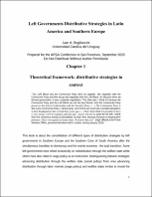JavaScript is disabled for your browser. Some features of this site may not work without it.
Left governments distributive strategies in Latin America and Southern Europe. Chapter 1: theoretical framework: distributive strategies in context
Resumen
This book is about the consolidation of different types of distributive strategies by left governments in Southern Europe and the Southern Cone of South America after thesimultaneous transition to democracy and the market economy –the dual transition. Some left governments have relied exclusively on redistribution through the welfare state while others have also relied in wage policy as an instrument. Distinguishing between strategies advancing distribution through the welfare state (social policy) from ones advancing distribution through labor markets (wage policy) and welfare states invites to revisit the political conflict of labor political inclusion in two regions with shared economic and political institutional roots (see Moore 1966; Stepan 1978). Three factors shape left governments choice: left unity, the historical recognition of labor as a political actor and the beliefs of policy makers with regard to the employmentwage trade-off. Left (dis)unity is the main factor shaping distributive strategies, in
particular with regards to wages, factor that is linked backwards with by the historical recognition of labor as a legitimate political actor before the dual transition and political decisions made by left parties or sectors during the dual transition. Left (dis)unity is linked forward, for shaping distributive strategies in the presence of labor-mobilizing parties or sectors, with the ideational importance macroeconomic equilibriums aquired for policymakers in attempting to conciliate employment and wage egalitarianism goals vis-àvis the pre-transitional period may also generate disunity. I refer to this as the employmentsalaries dilemma.
Colecciones
- Capítulos de libros [11]


